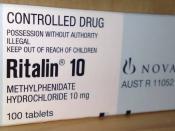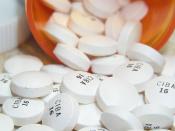Ritalin Research Paper
Drugs and Behavior
Abstract
Ritalin (Methylphenidate) is a mild CNS stimulant. In medicine, Ritalin's primary use is treatment of Attention Deficit /Hyperactive Disorder (ADHD). The mode of action in humans is not completely understood, but Ritalin presumably activates the arousal system of the brain stem and the cortex to produce its stimulant effect. Recently, the frequency of diagnosis for ADHD has increased dramatically. More children and an increasing number of adults are being diagnosed with ADHD. According to the Drug Enforcement Agency (DEA) (Bailey 1995), prescriptions for Ritalin have increased more than 600% in the past five years. Ritalin has a long history of controversy regarding side effects and potential for abuse, however it greatly benefits those with ADHD.
Ritalin Research Paper
Psychological effects of Ritalin
Ritalin (Methylphenidate) is manufactured by CIBA-Geigy Corporation. It is supplied in 5 mg., 10 mg., and 20 mg.
tablets, and in a sustained release form, Ritalin SR, in 20 mg. tablets. It is readily water soluble and is intended for oral use. It is a Schedule II Controlled Substance under both the Federal and Vermont Controlled Substance Acts. Ritalin is primarily used in the treatment of Attention Deficit/Hyperactive Disorder (ADHD) (Bailey 1995).
ADHD is a condition most likely based in an inefficiency and inadequacy of Dopamine and Norepinephrine hormone availability, typically occurring when a person with ADHD tries to concentrate. Ritalin improves the efficiency of the hormones Dopamine and Norepinephrine, increasing the resources for memory, focus, concentration and attention (Clark 1996).
Ritalin has been used for more than 30 years to treat ADHD. Nervousness and insomnia are the most common adverse reactions reported, but are usually controlled by reducing dosage or omitting the afternoon or evening dose. Decreased appetite is also common but...


